|
|
|
Sort Order |
|
|
|
Items / Page
|
|
|
|
|
|
|
| Srl | Item |
| 1 |
ID:
099854
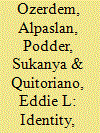

|
|
|
|
|
| Publication |
2010.
|
| Summary/Abstract |
The cessation of the governmental offensive to eliminate key figures of the separatist Moro Islamic Liberation Front (MILF) in 2009 imparted fresh impetus to the peace process in Mindanao, Philippines. Recent clashes have resulted in large-scale and ongoing displacement. This stalemate, together with the end of Gloria Macapagal Arroyo's Presidential term, has revived concerns about the future dynamics of the Bangsamoro struggle. An important dimension in this is the 'voluntary' nature of the participation of children and young people in the ranks of the MILF, sanctioned and often encouraged by their families and community. This presents an interesting contrast to the predominant literature on child soldiering that seems overly aligned with the coercive recruitment and related trauma-healing axis. In this article we examine the role of identity, ideology, the family and community in this presumed voluntary participation of children and youth in the MILF, in order to refine the linkage between recruitment experience of children and youth and their reintegration outcomes, and prescribe more appropriate reintegration interventions for youth in scenarios of participation sanctioned by family and community.
|
|
|
|
|
|
|
|
|
|
|
|
|
|
|
|
| 2 |
ID:
099850
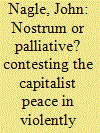

|
|
|
|
|
| Publication |
2010.
|
| Summary/Abstract |
In recent years the assumption that democracy automatically generates peace has been critiqued. It has instead been suggested that the promotion of economic liberalism provides a much stronger basis for peace. In this paper, we examine and contest the normative claims of the 'capitalist peace'. While there is a close association between extreme poverty and the onset of civil war, it is unclear whether economic liberalism will ameliorate conflict. A major reason for this ambiguity is because the emphasis of the 'capitalist peace' literature has largely been on interstate relations rather than intrastate ethnonational conflict. A closer look reveals that neoliberal policies in divided societies can also, in some contexts, exacerbate conflict in violently divided societies.
|
|
|
|
|
|
|
|
|
|
|
|
|
|
|
|
| 3 |
ID:
099852
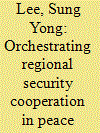

|
|
|
|
|
| Publication |
2010.
|
| Summary/Abstract |
By contrasting the peace negotiation processes in Cambodia and El Salvador, this paper argues that although the structural constraints against regional security cooperation in Southeast Asia and Central America during the 1980s were similar, the states in the two regions achieved varying success in overcoming two major structural constraints: the influence of global/regional actors and internal disunity. In particular, it focuses on how the political will and diplomatic skills of Indonesia and Mexico led to their different levels of contribution to the peace processes and their respective achievements. Through this, this paper intends to re-examine a core assumption of neorealism, that is, that structural constraints have a determinant influence on actors' behaviour.
|
|
|
|
|
|
|
|
|
|
|
|
|
|
|
|
| 4 |
ID:
099855
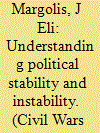

|
|
|
|
|
| Publication |
2010.
|
| Summary/Abstract |
This paper proposes a new understanding of political stability. In doing so, it reviews and critiques previous definitions, outlines five operational concepts, and identifies implications important to the practice of stability operations, current US government policy, and academic research.
It finds political stability to be the degree to which formal roles and structures coincide with informal roles and structures within a political object. The wider the 'gap,' the greater the instability. Uniquely, this view sees stability and instability as statements of potential, not occurrence.
|
|
|
|
|
|
|
|
|
|
|
|
|
|
|
|
| 5 |
ID:
099851
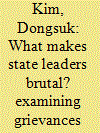

|
|
|
|
|
| Publication |
2010.
|
| Summary/Abstract |
What makes state leaders enmeshed in civil war commit mass killings against their own populations? This article explores this question by synthesizing grievances and mass killing. It investigates how factors or contexts that breed or exacerbate grievances can trigger state-sponsored mass killing during civil war. Severe political and economic marginalization and a history of intense armed conflict can engender staunch civilian support for insurgents, which prompts embattled rulers to orchestrate mass killing as a strategy of neutralizing insurgent combatants and warding off future rebellion. To verify this argument, a dataset is constructed that contains information on civil wars from 1945 to 2007 and large-N statistical analyses are conducted. The results corroborate the author's theoretical arguments with respect to political marginalization and history of armed conflict, but not with respect to economic marginalization. The argument and findings suggest that (1) grievances account for mass killing perpetrated by the government during civil war and (2) different sources of grievances have varying effects on mass killing.
|
|
|
|
|
|
|
|
|
|
|
|
|
|
|
|
| 6 |
ID:
099849
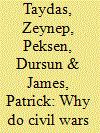

|
|
|
|
|
| Publication |
2010.
|
| Summary/Abstract |
As states get stronger, they are expected to be more successful in preventing insurgency and, in turn, the occurrence of civil wars. While intuitively appealing, the theoretical and empirical understanding of the linkage between state capacity and civil war onset remains at an early stage of development. To date, the role of state capacity has been conceptualised and measured in limited ways that focus mainly on the repressive ability of the state. In this paper, we broaden the understanding of state capacity by incorporating an important but neglected dimension; institutional quality. We examine the relationship between institutional quality and civil war onset and argue that states characterised with high institutional quality are less likely to experience civil war. Analysis of cross-national time-series data from 1984 to 1999 reveals that the quality of institutions, defined as freedom from corruption in government, rule of law, and bureaucratic quality, plays a significant role in explaining the likelihood of civil war onset.
|
|
|
|
|
|
|
|
|
|
|
|
|
|
|
|
| 7 |
ID:
099853
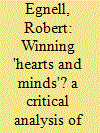

|
|
|
|
|
| Publication |
2010.
|
| Summary/Abstract |
This article conducts a critical analysis of the historical lessons, the assumptions and the conduct of 'hearts and minds' approaches to counter-insurgency. This results in challenges. Theoretically the 'hearts and minds' approach is rooted in modernisation theory and a normative Western approach to legitimacy that fails to live up to the expectations of the local population. The approach is also based on lessons from past successes such as the British 1950s campaign in Malaya. However, a great contextual shift has taken place since then and the relevance of past experiences is therefore questionable in a context of complex state-building in the wake of intervention. This also has practical consequences as we seek to rectify the often misapplied approaches of today.
|
|
|
|
|
|
|
|
|
|
|
|
|
|
|
|
|
|
|
|
|